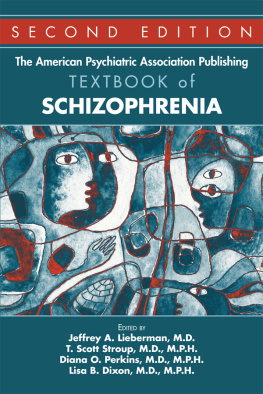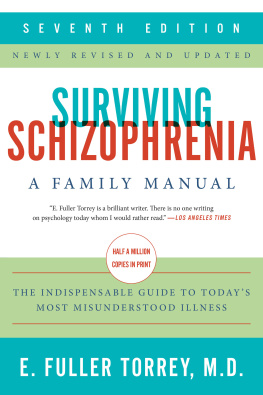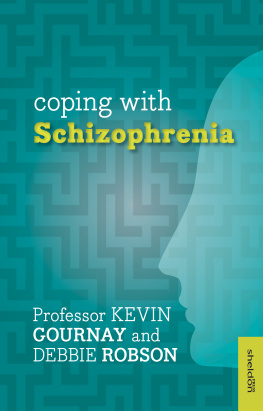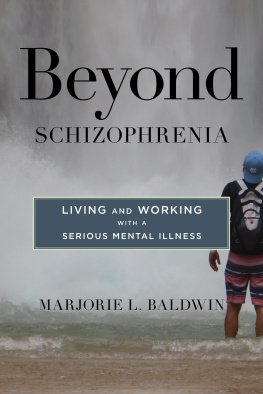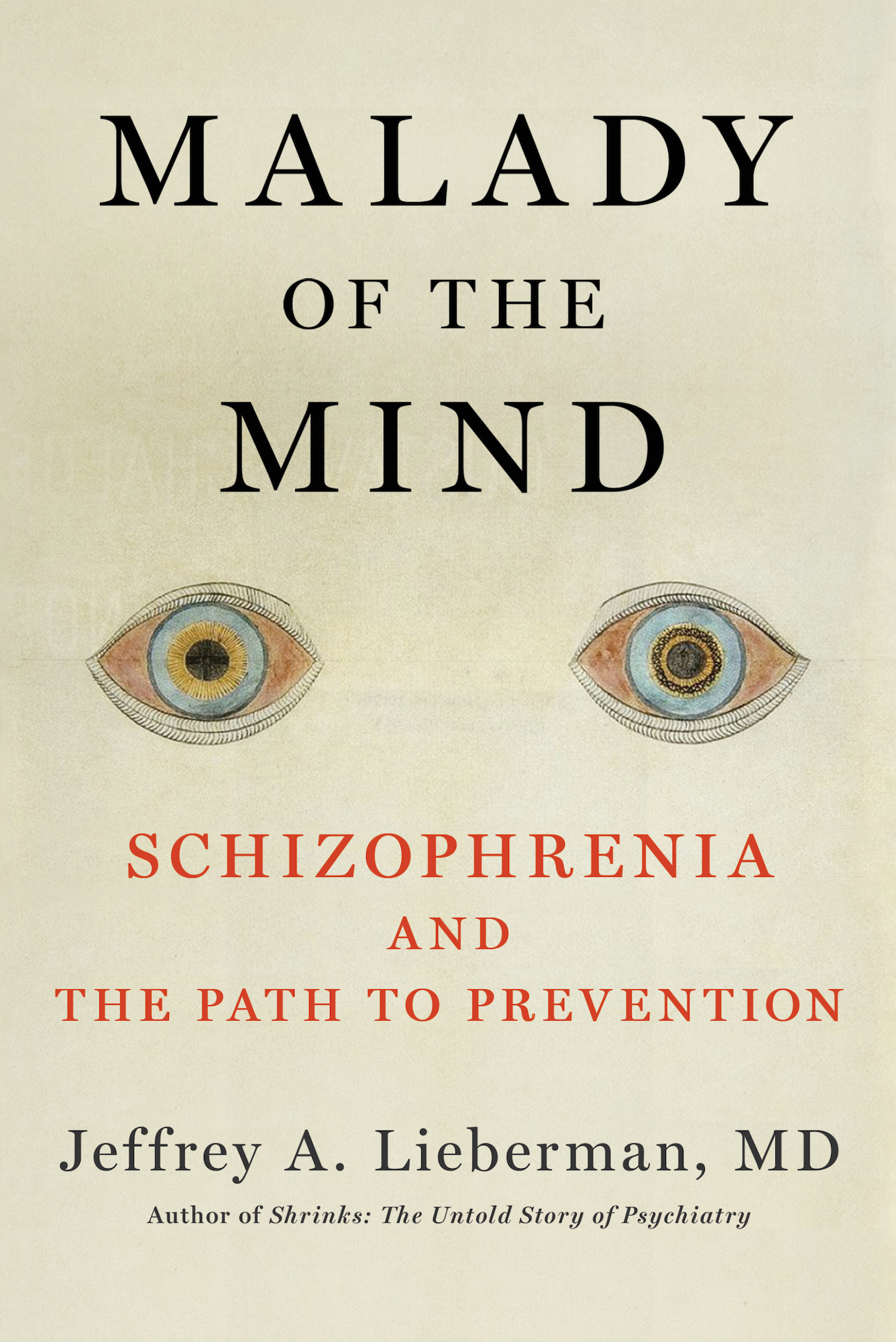Contents
Guide
Malady of the Mind
Schizophrenia and the Path to Prevention
Jeffrey A. Lieberman, MD
Author of Shrinks: The Unsold Story of Psychiatry
DISCLAIMER AND DISCLOSURE : All of the cases described in this book are based on real patients. Information was obtained through extensive interviews for the purposes of this book, conducted by the author or his assistant, with patients, family members, and significant others including health care providers, as well as from medical records and in some cases from articles in the news media. (These are also reflected in the Acknowledgments by the author [pp. 4056]). In addition to their verbal agreement, their participation and contributions to the book actively demonstrated their assent.
Assenting patients are described by their identifying characteristics. For all other patients, names and other identifying characteristics were changed. In some cases, the patients described are composites of more than one person, in order to represent important manifestations of schizophrenia. In the interest of parsimony, I have referred to specific scientists and psychiatrists who played seminal roles in the evolution of psychiatry to represent like-minded contemporaries rather than describe each individually. This should not be construed as ignoring or diminishing the achievements of the other contemporaries who are not mentioned by name.
All studies discussed with which I was involved were reviewed and approved by the jurisdictional Institutional Review Boards and subjects enrolled provided informed consent. Other studies referred to from the scientific literature are presumed to have done the same.
The sources of all quotes and cited information are listed in the Notes section. As regards conflicts of interest, the author has no financial equity in any pharmaceutical, biotechnology, or medical device companies and does not receive financial remuneration for marketing and speaking engagements from any company.
For Michael Juman
19651994
It is a riddle, wrapped in a mystery, inside an enigma; but perhaps there is a key.
Winston Churchill
P ROLOGUE
Jonah was twenty years old when I met him: gifted, intelligent, prepossessed with lofty ambition and limitless potential. He was the youngest child in an orthodox Jewish family whose ancestors had emigrated from Poland after World War I and settled in Brooklyn. His family was considered religious elite, descended directly from the Kohanimpriests whose lineage could be traced to Aaron, the prophet Mosess brother. Jonah was an academic prodigy, a young man who radiated confidence, and his parents saw him as the worthy heir to the familys religious lineone of the intellectual chosen. They had invested much in their sons future success: money, attention, aspirations. Rather than feeling burdened by the pressure of their expectations, Jonah reveled in his special status. Like many good Jewish boys, he was going to be a doctorand not just another doctor, but a great doctor, his mother would boast.
But in 1980, when Jonah was a freshman in college, his glorious future began to unravel. Always diligent, impeccably groomed, and well mannered, Jonah started missing classes, appearing disheveled, and acting in a strange and self-absorbed manner. He obsessed over obscure philosophical issues and constantly badgered others about them. Jonahs roommate, alarmed by the change, notified the dormitory supervisor, who called Jonahs parents to say that he was taking their son to the student health service. Jonahs parents instead insisted on coming to get him.
They brought Jonah to Mount Sinai Hospital in New York City, where I was a junior faculty member in psychiatry on night call. Jonah was experiencing his first episode of psychosis and, based on his history and symptoms, was likely developing schizophrenia. (Today it would be called schizophreniform disordera variant of schizophrenia in which symptoms have been present for less than six months.) He was admitted to the inpatient psychiatric service and treated with antipsychotic medication.
Jonahs symptoms receded, and, within four weeks, they had almost disappeared. When he was discharged, I agreed to follow him for his aftercare treatment. But after a few weeks of sporadic attendance at his appointments, Jonah abruptly terminated treatment and, eager to retain his credits for the semester, returned to school.
Twelve weeks later, Jonah was sick again. Believing that the remission of his symptoms meant he didnt need the medicine any longer, he had simply stopped taking it. Predictably, his symptoms soon recurred, and by the time his parents called me, panic stricken, Jonah was on the verge of a full-blown psychotic relapse. Voices were telling him that the world was on the precipice of disaster. He saw portents of danger everywhere; he worried that Gods will was being defeated, and the world would end.
We readmitted Jonah to the hospital and prescribed another antipsychotic with a different side effect profile, thinking that perhaps unpleasant side effects had contributed to his discontinuing his medication. Fortunately, his symptoms responded well to treatment, and he was given another chance to resume his life. But Jonah stumbled again. He felt that his ability to study was impaired by the mental fogginess and physical shakiness that the medication caused. And so, buoyed by his second dramatic recovery, and impelled by youthful imprudence, Jonah decided after six months to once again stop taking his medication. Two more relapses and hospitalizations later, Jonah finally had to drop out of college.
Feeling frustrated and helpless, I asked a former supervisor for advice. How could I help Jonah break this cycle of relapse and hospitalization? Rather than words of wisdom or empathy, he said blithely, You just have to let some patients suffer and learn the hard way by having multiple relapses before they accept the need for treatment.
I was stunned. He was speaking about someone with schizophrenia the way people spoke of drug addicts or alcoholics who needed to hit rock bottom. Jonahs life was at stake, and the supervisors attitude was shockingly callous. Imagine an oncologist saying something similar about a cancer patient whod stopped chemotherapy because of the noxious side effects. You just have to wait till the cancer spreads before they learn to accept chemotherapy. To my mind, my supervisors comment was no different.
In fairness to Jonah, how could he have been expected to know about the potentially devastating consequences of schizophrenia? While most people have some understanding of cancer, heart disease, and diabetes, their knowledge of schizophrenia is likely vague or nonexistent. Psychoeducationin which mental health staff educate patients and families about the nature of an illness and what they might expect for the futurewas first introduced in the medical literature in 1980 but didnt become well known for another decade, and even now, it isnt widely practiced. When Jonah fell ill, psychiatry was just emerging from an era in which its doctors were proscribed from revealing diagnoses to patients or discussing them with their families. While Jonah and his family knew that he was sick, they didnt realize that his illness was recurrent and could cause irreparable damage, permanently impairing his ability to function, unless he received and stuck to the treatment he needed. Sadly, those of us treating Jonah did not take the initiative to explain this to them until it was too late. In fact, our training had actively discouraged us from doing so; educating patients and their families about an illness such as schizophrenia was thought to be inappropriate and even detrimental.



